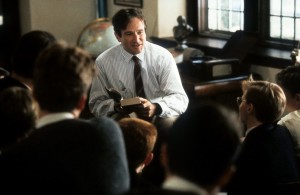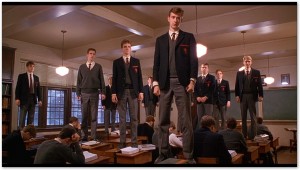I am thirty-eight years old and until yesterday I never knew what it felt like to experience a throbbing and palpable sadness over the death of a celebrity. Superlatives abound on a global scale for a man who embodied a form of dramaturgical genius that is perhaps the most eclectic of our time.
[fusion_builder_container hundred_percent=”yes” overflow=”visible”][fusion_builder_row][fusion_builder_column type=”1_1″ background_position=”left top” background_color=”” border_size=”” border_color=”” border_style=”solid” spacing=”yes” background_image=”” background_repeat=”no-repeat” padding=”” margin_top=”0px” margin_bottom=”0px” class=”” id=”” animation_type=”” animation_speed=”0.3″ animation_direction=”left” hide_on_mobile=”no” center_content=”no” min_height=”none”]
As much as I laughed at Good Morning Vietnam (which he should have won a Best Actor Oscar for) and Mrs. Doubtfire, as much as I was touched by the poignancy of his wisdom in Good Will Hunting, and as much as I cried over the tragedy of his character in The Fisher King, Robin Williams will always be remembered in my heart as the man who brought John Keating to life in Dead Poet’s Society (DPS). Stand and Deliver, The Man Without a Face, and Mr. Holland’s Opus all stand out as cinematic paeans to the artistry of teaching. And yet, nothing can lay a glove on the extraordinary impact Dead Poet’s Society had on a generation of American school teachers.
It wasn’t just John Keating’s humor and humanity that made him a once-in-a-lifetime teacher for his students, it was more than his learned diction and off-the-cuff eloquence, and while the dramatic nature of his presentation—standing on desks, ripping pages out of text books, whispering “Carpe Diem” into the impressionable ears of his new students—was ripe for emulation, it is two lessons from John Keating that will stand the test of time.
The most vivid revelation of watching DPS occurs when observing the wonderment of his students. Such wonderment is the summit of any teacher’s wildest dreams. And yet, this wonderment is more that naked entertainment or inchoate amusement—it is a seed of significance being planted in the hearts and minds of students. Wonderment is a short step from genuine and unfettered inspiration. John Keating does what all significant teachers do: they make the world larger, deeper, and richer than their students ever imagined it was or could ever be. When students feel the electrification of inspiration they do more than become passive observers of their own lives. They seek to have their voices contribute to the chorus of humanity itself. They yearn to transcend the ordinary and the banal. In short, the greatness of John Keating is that he reveals that learning and life are not separate endeavors. Indeed, they are two sides of the same coin of life. His students suddenly feel the tug to do more than read poetry, but seek to live out its enchantments and promises. Words that were once just words—love, friendship, bliss—suddenly become the clay and the marble of a richer world of experience and possibility.
The second lesson from John Keating is not for students, but directed towards us teachers. There is a touching scene when Keating’s star pupil, Neil, earnestly asks, “How can you be here? You can do anything?” Keating’s response is instructive; he doesn’t want to be anywhere else because he is a teacher, he is doing with his life what he was born to do. One of the characteristics of teaching greatness is that such teachers do not see their profession as merely a job. For them, teaching is a calling and a craft. It is not a vocation; it is a form of artistry. Significant teachers anchor their very being, their identity itself, deep into the floor of a classroom; for it is there that they synthesize the ideal with the real. No one can imagine John Keating as a principal or a librarian because it runs counter to his innate self.
[/fusion_builder_column][fusion_builder_column type=”1_1″ background_position=”left top” background_color=”” border_size=”” border_color=”” border_style=”solid” spacing=”yes” background_image=”” background_repeat=”no-repeat” padding=”” margin_top=”0px” margin_bottom=”0px” class=”” id=”” animation_type=”” animation_speed=”0.3″ animation_direction=”left” hide_on_mobile=”no” center_content=”no” min_height=”none”]
The conclusion of DPS is the greatest ending of any movie I have ever watched, filled with a form of stentorian loyalty, love, and affection normal life rarely affords us. The young men stand on their desks expressing a form of unselfish fidelity to their beloved teacher who is being wrongly punished (the parallels from Ancient Greece of Socrates and Crito cannot be overlooked). But what makes the ending not simply great but transcendent, are the bagpipes…the bagpipes ring out and I remember watching DPS for the first time—suddenly as I sat in the movie theater I experienced a vivid resonation build up within the walls of my thirteen-year-old chest that, at the time, I has no ability to describe or articulate. Was I sad? Was I sick? No…that feeling was my first brush with unfettered inspiration. Mr. Keating spoke out once more, “Thank You Boys, Thank You.”
On this day, I hope all teachers the world over are thankful for the genius of Robin Williams and his ability to bring John Keating to life. I know I am. And whatever else, I certainly hope the bagpipes are playing in the streets of heaven today.[/fusion_builder_column][/fusion_builder_row][/fusion_builder_container]





